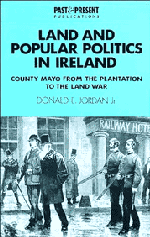Book contents
- Frontmatter
- Contents
- List of figures
- List of maps
- List of tables
- Acknowledgments
- List of abbreviations
- Introduction
- PART 1 COUNTY MAYO PRIOR TO THE FAMINE
- PART 2 THE POST-FAMINE TRANSFORMATION OF COUNTY MAYO
- PART 3 THE LAND WAR IN COUNTY MAYO
- 6 The West's Awake! The early months of the Land War
- 7 The centralization of the agitation, June 1879-April 1880
- 8 Tensions within the Land League in County Mayo, 1880
- 9 The collapse of the land agitation, 1880-1881
- 1 Mayo evictions: explanation of calculations and sources for Table 4.1 and Figure 4.1
- 2 Occupations of suspected Fenians, County Mayo, as recorded in police files, 1866-71
- 3 List of persons whose arrest is recommended under the Protection of Persons and Property Act, 1881, County Mayo
- 4 Explanation of categories and list of Land League meetings for Map 5.2 and Table 3.1
- Bibliography
- Index
- Past and Present Publications
9 - The collapse of the land agitation, 1880-1881
Published online by Cambridge University Press: 03 May 2011
- Frontmatter
- Contents
- List of figures
- List of maps
- List of tables
- Acknowledgments
- List of abbreviations
- Introduction
- PART 1 COUNTY MAYO PRIOR TO THE FAMINE
- PART 2 THE POST-FAMINE TRANSFORMATION OF COUNTY MAYO
- PART 3 THE LAND WAR IN COUNTY MAYO
- 6 The West's Awake! The early months of the Land War
- 7 The centralization of the agitation, June 1879-April 1880
- 8 Tensions within the Land League in County Mayo, 1880
- 9 The collapse of the land agitation, 1880-1881
- 1 Mayo evictions: explanation of calculations and sources for Table 4.1 and Figure 4.1
- 2 Occupations of suspected Fenians, County Mayo, as recorded in police files, 1866-71
- 3 List of persons whose arrest is recommended under the Protection of Persons and Property Act, 1881, County Mayo
- 4 Explanation of categories and list of Land League meetings for Map 5.2 and Table 3.1
- Bibliography
- Index
- Past and Present Publications
Summary
The final year of the land agitation was a period of great despair in Mayo. The harvest of 1880, while improved over the previous years in the core, had not improved in the periphery. The sharp rise in emigration during the year demonstrated the degree to which Mayo people had lost faith in the land system, but it also reflected their distrust in the ability of the Land League to reform that system. Reporting for The Daily News on a land meeting held at Tiernaur, County Mayo in October 1880, Bernard Becker found the people “rather tired than excited by the proceedings.” While there was no decline in the number of land meetings during 1880, there was a noticeable reduction in enthusiasm for the League, with Fenians rather than Land Leaguers often dominating the proceedings. At several meetings in October, including the one attended by Becker, The Connaught Telegraph noted that the League failed to send promised delegations to Mayo meetings, thus contributing to the decline in its support among Mayo farmers.
A further indication of the League's loss of influence in Mayo was the dramatic increase in agrarian crime during the fall of 1880. The murder in late September 1880 of Lord Mountmorris, an unpopular landlord and magistrate, near Clonbur, County Galway, a few miles from the Mayo border, highlighted the serious nature of the new wave of agrarian crime.
- Type
- Chapter
- Information
- Land and Popular Politics in IrelandCounty Mayo from the Plantation to the Land War, pp. 283 - 313Publisher: Cambridge University PressPrint publication year: 1994



